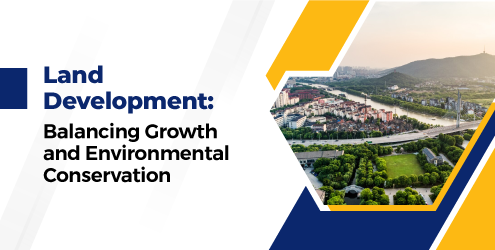In civil engineering, you may have separate sessions on land development. It involves the planning, design, and construction of infrastructure projects on undeveloped land. Engineers may use the terms site development or site engineering. The population is increasing, and the requirement for land, especially for business, housing, and infrastructure improvement, has begun to increase. Therefore, the goal is to bring sustainability to land development projects and eliminate the negative impact on the environment. The top PhD civil engineering college in Coimbatore needs to incorporate learning about innovative technologies, green building materials and practices, and renewable energy sources into action. This blog shows a glance at how civil engineers look at site development in the future and also challenges to the environment.
Let’s start with the definition of land development.
Land development converts undeveloped land into developed land for various purposes, including residential, commercial, and industrial. The civil engineers are solely responsible for land surveying, design, grading, paving and drainage, and infrastructure, including roads, utilities, and facilities. Land development needs to be looked after,
Site analysis: Scrutinise the drafting regulations, guidelines, and land use strategies to decide the best utilisation of the land and distinguish potential essentials to development. Also look after the factors influencing land development (soil type, topography, etc.).
Planning: Layout of the project to boost productivity and think about the current geology, existing foundation, normal highlights, and guidelines
Design: Detailed design of projects after assessing the components like streets/access, parking, utility lines, stormwater, the board, and other related foundations
Construction: arranging and ensuring quality and safety controls during the construction process. Follow up on the project in terms of excavation, grading, and work. Also holds the documents regarding the resting and built survey reports.
Landscaping: The last visual appearance of the construction project to establish an aesthetically and eco-friendly
Land development and environmental challenges
- Rural communities have changed widely as a result of urbanisation. The growth of cities has grown in certain rural areas to the point where the community has been lost. Other places have become ghost towns as a result of the lack of opportunities. Urban and rural people and problems are brought together via suburbanization. Rural areas make up most of the earth’s surface, most watersheds, and the majority of the atmosphere.
- Urban populations and organisations have genuine worries about how rural natural resources are used and maintained, just as rural inhabitants have valid concerns about the demands that cities place on the environment. These common environmental concerns have significant economic, social, and political consequences that could have a significant impact on society in the future.
- In regulating land usage, the public interest and private property rights have to operate in balance. Although transforming land use has numerous positive economic and social effects, it also has significant negative economic effects on society. In order to achieve sustainable development and long-term economic growth, land conservation is a crucial component. However, land use policy needs to find a balance between public welfare and the rights of private property.
- Numerous environmental issues, including air pollution, water pollution, and the loss of wildlife habitat, have been associated with urban expansion. Globally, the health, productivity, and biodiversity of the marine environment are at risk because of urban growth and agricultural practices in interior and coastal locations.
- A gap between private and social costs for particular land uses brought about by environmental and external factors results in a poor allocation of land. Regulation of land use can take many different forms. Zoning, density restrictions, and other direct land use limitations are frequently used in the classic controlling and regulating strategy.
- Even though these regulations can be extremely successful as regulatory measures, the increased cost of housing, smaller homes, and inefficient land use patterns could cause significant social welfare losses.
- In many communities, especially those that are experiencing rapid urbanisation, land use control is a difficult topic. Land use planning, according to critics, preserves agriculture, forests, water quality, open space, and wildlife habitat while also raising the value of properties and improving public health. This rapid expansion will harm long-term economic growth and the environment.
Future sustainability in land development:
- Practical improvement techniques help countries and organisations adapt to the challenges posed by environmental change.
- This enables networks to grow and protects important regular assets for both current and future generations.
- State-run governments around the world have come to realise this and are starting to implement policies that support rational turns of events and hold privately owned enterprises accountable for their actions.
To conclude, land development is a vast topic where engineers need to understand the challenges to bring out the potential solutions for both clients and people. The best placement engineering colleges in Coimbatore provide the knowledge of how to make efficient management and processes with the technologies in site development.


